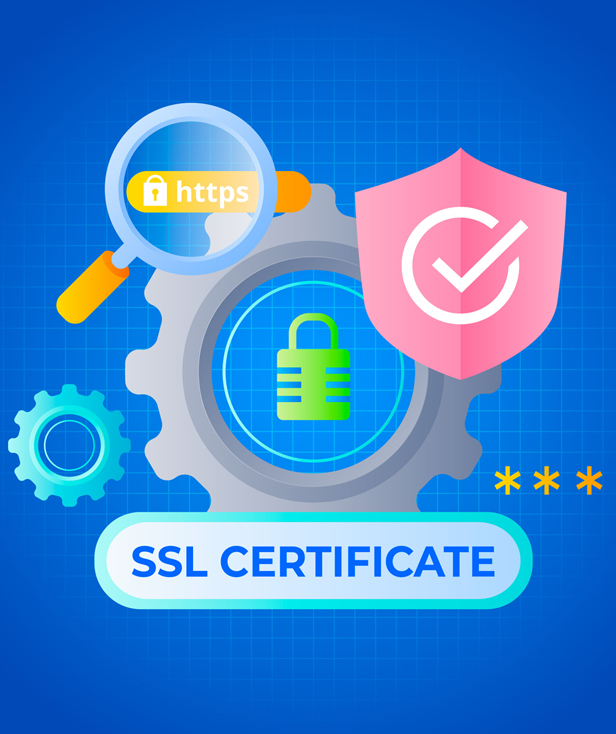


What Is an SSL Certificate?
SSL, or Secure Sockets Layer, is a cryptographic protocol designed to secure communication over the internet. An SSL certificate is a digital certificate that serves as a key component of SSL encryption. It is essentially a digital "passport" that verifies the identity of a website and encrypts data transmitted between the user's browser and the web server.
How SSL Encryption Works
SSL encryption ensures that sensitive information, such as login credentials, credit card numbers, and personal data, is transmitted securely between a user's browser and a website's server. It accomplishes this by encrypting the data into an unreadable format during transmission and decrypting it only when it reaches its intended destination.
The primary reason SSL certificates matter is data security. Without SSL encryption, data transmitted between a user's browser and a website's server is vulnerable to interception by malicious actors. SSL certificates prevent this by encrypting the data, making it nearly impossible for unauthorized parties to decipher.
SSL certificates also serve as a means of authentication and trust. When a website has an SSL certificate, it undergoes a validation process to confirm its legitimacy. Visitors to your site can see this validation through visual cues like a padlock icon in the browser's address bar or the "https://" prefix in the URL.
Search engines, notably Google, prioritize secure websites in their search rankings. Having an SSL certificate can boost your website's search engine optimization (SEO) efforts. Google's algorithms consider HTTPS as a ranking factor, which means that secure websites tend to rank higher in search results.
DV certificates are the most basic and affordable option. They validate the ownership of the domain but do not verify the identity of the organization. They are suitable for blogs, personal websites, or small businesses where strong customer trust is not a primary concern.
OV certificates provide a higher level of validation by confirming the authenticity of the organization. This involves verifying the organization's legal existence and its right to use the domain. OV certificates are ideal for businesses and e-commerce websites seeking to establish trust.
EV certificates offer the highest level of validation and trust. Websites with EV certificates undergo a rigorous validation process, including legal and physical checks. The result is a prominent green address bar in most browsers, signifying the highest level of security and trust.
Wildcard certificates secure a domain and all its subdomains with a single certificate. For example, a wildcard certificate for "example.com" would also cover "blog.example.com" and "shop.example.com."
Multi-Domain (SAN) certificates allow you to secure multiple domains and subdomains with a single certificate. This is beneficial for businesses managing several websites under one umbrella.
Code Signing certificates are used by software developers and publishers to digitally sign their applications and code. This assures users that the software has not been tampered with and comes from a trusted source.
Choose a trusted Certificate Authority to purchase your SSL certificate. Popular CAs include Comodo, DigiCert, and GlobalSign.
This is a file containing your website's details and public key. You'll need to provide this CSR to the CA during the certificate purchase process.
Depending on the type of certificate, you may need to go through domain validation, organization validation, or extended validation.
After obtaining the certificate, install it on your web server following the CA's instructions. Many web hosting providers offer easy SSL certificate installation.
Ensure that all references to your website's resources (e.g., links, images, scripts) use "https://" to prevent mixed content issues.
Regularly monitor your SSL certificate's expiration date and renew it as needed to maintain security.
An SSL certificate is a digital certificate that encrypts the data transmitted between a user's browser and your website, ensuring secure communication. It is essential for data security, user trust, and SEO ranking.
There are several types, including Domain Validated (DV), Organization Validated (OV), Extended Validation (EV), and Wildcard SSL certificates, each with varying levels of validation and coverage.
The choice depends on your website's purpose. For e-commerce, an EV SSL is recommended for maximum trust. DV and OV certificates are suitable for most other websites.
First, you need to purchase the SSL certificate from a trusted Certificate Authority (CA), provide required documentation for validation (for OV and EV certificates), and then install it on your server.
The time varies based on the type of certificate and the CA. DV certificates can be issued within minutes, while OV and EV certificates may take a few days due to validation processes.
Yes, you can transfer SSL certificates, but the process involves reissuing the certificate with the new hosting provider's information.
Yes, SSL certificates have expiration dates. You can renew them through your CA or hosting provider. It's crucial to keep certificates up to date to maintain security.
Without an SSL certificate, your website will be marked as "Not Secure" by browsers, potentially scaring away visitors and negatively impacting your SEO. Data security is also compromised.
SSL certificates primarily protect against data interception during transmission. They do not protect against all cyber threats, such as DDoS attacks or malware.
Yes, some CAs offer free DV SSL certificates, such as Let's Encrypt. However, for higher levels of validation and coverage, paid certificates are often necessary for better security and trustworthiness.